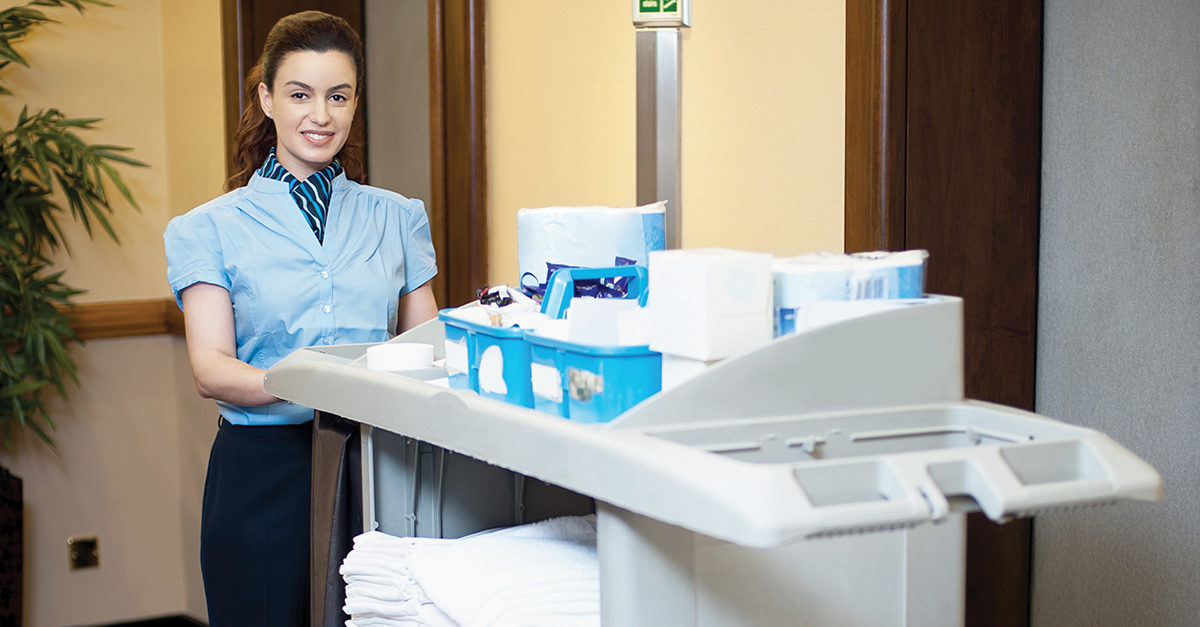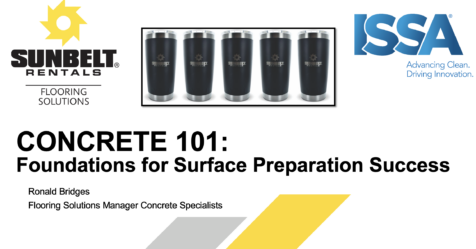Hotels in the United States generate billions of dollars every year. According to data from STR Analytics, in 2014, the industry reached US$176 billion in revenue, an increase of nearly $14 billion from 2013 and an all-time high.
Based on these numbers, if you’re a building service contractor (BSC), and you’re interested in servicing the hospitality industry, now is the time for you to cultivate relationships with local and national hotels (Editor’s Note: More advice on how to do this is available on page 14). By learning the ins and outs of hotel cleaning from your fellow BSCs, you can successfully integrate into the business and satisfy your clients.
The following are some of the issues you may come across while cleaning hotels, best practices for getting the job done, and advice on how to properly train your team of employees as told by BSCs themselves.
Challenges of Cleaning Hotels
Hotels are unique when compared to other commercial properties you may be responsible for maintaining. They operate on a different schedule, never actually close for the day, and people are constantly going in and out of them.
Jo Ann Miya, regional director of OpenWorks in California, says her company cleans offices and multitenant buildings. However, the hotel it services is challenging, she said, because guests use the restrooms 24 hours a day, seven days a week. This differs from an office space, where most employees go home at a particular time and cleaning staff can work after hours once office employees have left for the day.
Timing is also a concern in terms of scheduling services due to hotel guests’ unpredictable schedules. Juan Catoni, vice president of franchise operations for Anago Cleaning Systems, said typically, “guests don’t check out of the hotel at the proper time, so you have to keep a crew at the hotel for a longer time than typically planned.”
Leslie Dasch, president of Yes Hotel Services, works for hotels in Florida. She also oversees the cleaning of facilities in the northeast as well as Louisiana. “When cleaning a hotel, you must be conscious of not disturbing the guests’ experience,” she said. “Providing a clean and safe environment, while thousands of busy guests enjoy the hotel amenities, is a constant challenge of cleaning hotels.”
Finding janitors who want to work for your team long term can prove to be difficult as well, according to David Tucker, hospitality division director at Jani-King International, Inc., who says turnover in the housekeeping department can be exceedingly high. “Occupancies are cyclical,” he said, “so there are periods that you have too many staff members and others when you don’t have enough.”
How Contractors Clean and Service Hotels
Once you determine how to deal with the challenges of working in the hospitality industry, you can dive into the day-in and day-out cleaning practices.
Hotel Rooms
Before starting any hotel job, Catoni said that the franchisee will do an inspection of every room on each floor. Then, after each job that’s completed, “the franchisee reports to management to ensure the job is done to the hotel’s standard. Each hotel room is double checked to ensure satisfaction.”
The cleaners, he said, will use the same supplies to clean guest rooms as they do to clean offices. This includes disinfectant, germicide, microfiber cloths, and backpack vacuums. The only difference, he said, is in how you organize each room’s linens, such as pillows and sheets. “You must learn the standard for the particular hotel and clean to their standard,” he said.
Tucker’s cleaners also use microfiber cleaning rags and mops when working on a room. He said that’s because they’re washable and reduce the amount of dust in an environment.
Common Areas and General Cleaning
To ensure that OpenWorks’ team cleans a hotel’s common area bathrooms—such as the ones in the lobby—for health as well as aesthetics, Miya said they utilize “professional commercial-grade disinfectants [and] color-coded microfiber towels to prevent cross contamination.” For general cleaning throughout the rooms and public areas of the hotel, Dasch’s associates will use automatic scrubbers, carpet extractors and encapsulators, escalator cleaners, burnishers, high-volume wet/dry vacuums, grit brushes, and controlled splashing floor washing machines.
Hotel Kitchens
To clean kitchens in a safe and effective manner, Dasch said her team will scale back on the amount of chemicals and water they use. “Modern, high-tech kitchen equipment (ovens, fryers, grills and kettles) adds a unique set of challenges because they contain expensive computers and motherboards and highly technical switching devices,” she said. “Gone are the days of pressure washing or even water hosing down kitchens. Limited, controlled water and chemicals use is mandatory to prevent damage to this expensive equipment.”
Training Cleaners for Safety and Customer Service
Since cleaners don’t have the luxury of working after hours while no occupants are around, they need to be informed about interacting with customers and upholding safety standards.
Dasch said they focus on hiring and training employees both behind the scenes and after hours.
Additionally, safety and slip resistance is also important. Depending on the hotel, there may be floors, walkways, pools and spas, kitchens, fitness centers, and other public areas to consider. To avoid slips and falls, Miya said that her team displays wet floor signs while cleaning and after the job is done until the floors are completely dry.
In terms of speaking with the guests, Catoni said that cleaners are trained “to be polite with every guest. Every guest has a different attitude towards the cleaners,” he said. “You must knock on the door and be as polite as possible and accept the complaints from the guests with a smile.”
Tucker said that his company uses a method called the 10-5 principle. “If a guest is 10 feet away, you make eye contact and acknowledge with a smile,” he said. “Once they are five feet or closer, you speak to the guest. You tell them good morning, good afternoon, etc. Some hotels use different methods, and we train our staff to meet the goals of the hotel.”
Above all, BSCs and their staff have to realize that they are the face of the hotel, even though they may represent a different company on paper. They must make sure they’re able to meet and even exceed their clients’ expectations at all times.




